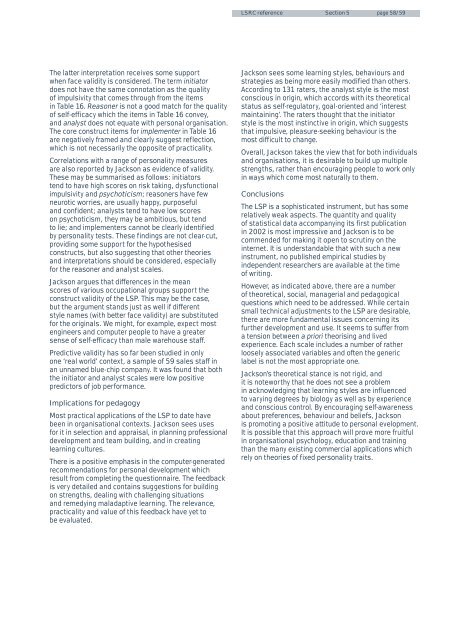learning-styles
learning-styles
learning-styles
You also want an ePaper? Increase the reach of your titles
YUMPU automatically turns print PDFs into web optimized ePapers that Google loves.
LSRC reference Section 5<br />
page 58/59<br />
The latter interpretation receives some support<br />
when face validity is considered. The term initiator<br />
does not have the same connotation as the quality<br />
of impulsivity that comes through from the items<br />
in Table 16. Reasoner is not a good match for the quality<br />
of self-efficacy which the items in Table 16 convey,<br />
and analyst does not equate with personal organisation.<br />
The core construct items for implementer in Table 16<br />
are negatively framed and clearly suggest reflection,<br />
which is not necessarily the opposite of practicality.<br />
Correlations with a range of personality measures<br />
are also reported by Jackson as evidence of validity.<br />
These may be summarised as follows: initiators<br />
tend to have high scores on risk taking, dysfunctional<br />
impulsivity and psychoticism; reasoners have few<br />
neurotic worries, are usually happy, purposeful<br />
and confident; analysts tend to have low scores<br />
on psychoticism, they may be ambitious, but tend<br />
to lie; and implementers cannot be clearly identified<br />
by personality tests. These findings are not clear-cut,<br />
providing some support for the hypothesised<br />
constructs, but also suggesting that other theories<br />
and interpretations should be considered, especially<br />
for the reasoner and analyst scales.<br />
Jackson argues that differences in the mean<br />
scores of various occupational groups support the<br />
construct validity of the LSP. This may be the case,<br />
but the argument stands just as well if different<br />
style names (with better face validity) are substituted<br />
for the originals. We might, for example, expect most<br />
engineers and computer people to have a greater<br />
sense of self-efficacy than male warehouse staff.<br />
Predictive validity has so far been studied in only<br />
one ‘real world’ context, a sample of 59 sales staff in<br />
an unnamed blue-chip company. It was found that both<br />
the initiator and analyst scales were low positive<br />
predictors of job performance.<br />
Implications for pedagogy<br />
Most practical applications of the LSP to date have<br />
been in organisational contexts. Jackson sees uses<br />
for it in selection and appraisal, in planning professional<br />
development and team building, and in creating<br />
<strong>learning</strong> cultures.<br />
There is a positive emphasis in the computer-generated<br />
recommendations for personal development which<br />
result from completing the questionnaire. The feedback<br />
is very detailed and contains suggestions for building<br />
on strengths, dealing with challenging situations<br />
and remedying maladaptive <strong>learning</strong>. The relevance,<br />
practicality and value of this feedback have yet to<br />
be evaluated.<br />
Jackson sees some <strong>learning</strong> <strong>styles</strong>, behaviours and<br />
strategies as being more easily modified than others.<br />
According to 131 raters, the analyst style is the most<br />
conscious in origin, which accords with its theoretical<br />
status as self-regulatory, goal-oriented and ‘interest<br />
maintaining’. The raters thought that the initiator<br />
style is the most instinctive in origin, which suggests<br />
that impulsive, pleasure-seeking behaviour is the<br />
most difficult to change.<br />
Overall, Jackson takes the view that for both individuals<br />
and organisations, it is desirable to build up multiple<br />
strengths, rather than encouraging people to work only<br />
in ways which come most naturally to them.<br />
Conclusions<br />
The LSP is a sophisticated instrument, but has some<br />
relatively weak aspects. The quantity and quality<br />
of statistical data accompanying its first publication<br />
in 2002 is most impressive and Jackson is to be<br />
commended for making it open to scrutiny on the<br />
internet. It is understandable that with such a new<br />
instrument, no published empirical studies by<br />
independent researchers are available at the time<br />
of writing.<br />
However, as indicated above, there are a number<br />
of theoretical, social, managerial and pedagogical<br />
questions which need to be addressed. While certain<br />
small technical adjustments to the LSP are desirable,<br />
there are more fundamental issues concerning its<br />
further development and use. It seems to suffer from<br />
a tension between a priori theorising and lived<br />
experience. Each scale includes a number of rather<br />
loosely associated variables and often the generic<br />
label is not the most appropriate one.<br />
Jackson’s theoretical stance is not rigid, and<br />
it is noteworthy that he does not see a problem<br />
in acknowledging that <strong>learning</strong> <strong>styles</strong> are influenced<br />
to varying degrees by biology as well as by experience<br />
and conscious control. By encouraging self-awareness<br />
about preferences, behaviour and beliefs, Jackson<br />
is promoting a positive attitude to personal evelopment.<br />
It is possible that this approach will prove more fruitful<br />
in organisational psychology, education and training<br />
than the many existing commercial applications which<br />
rely on theories of fixed personality traits.


